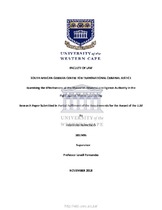| dc.contributor.advisor | Fernandez, Lovell | |
| dc.contributor.author | Francisco, Felisters | |
| dc.date.accessioned | 2019-11-08T08:42:51Z | |
| dc.date.available | 2019-11-08T08:42:51Z | |
| dc.date.issued | 2018 | |
| dc.identifier.uri | http://hdl.handle.net/11394/7080 | |
| dc.description | Magister Legum - LLM | en_US |
| dc.description.abstract | Money laundering (hereafter ML) is a multidisciplinary topic which has become important since the late 1980s. The term ‘laundering’ literally means ‘washing’ or ‘removing dirt’. It has been defined as the conversion of criminal income into assets that cannot be traced back to the underlying crime. Criminals use ML as a way of keeping control over the proceeds of crime and to provide, ultimately, a cover for their income and wealth. ML occurs every time any transaction takes place, regardless of whether it involves any form of property or benefit, whether tangible or not tangible, which is derived from criminal activity. ML is regulated at the global, regional and national levels. To combat ML and other financial crimes, Malawi enacted the Financial Crimes Act (hereafter FCA). The FCA establishes the Financial Intelligence Authority (hereafter FIA) as an institution whose objectives include collecting financial intelligence regarding suspicious transactions. | en_US |
| dc.language.iso | en | en_US |
| dc.publisher | University of the Western Cape | en_US |
| dc.subject | Anti-money laundering | en_US |
| dc.subject | FATF recommendations | en_US |
| dc.subject | Malawi | en_US |
| dc.subject | Money laundering | en_US |
| dc.subject | Financial Intelligence Authority | en_US |
| dc.title | Examining the effectiveness of the Malawian Financial Intelligence Authority in the fight against money laundering | en_US |
| dc.rights.holder | University of the Western Cape | en_US |

